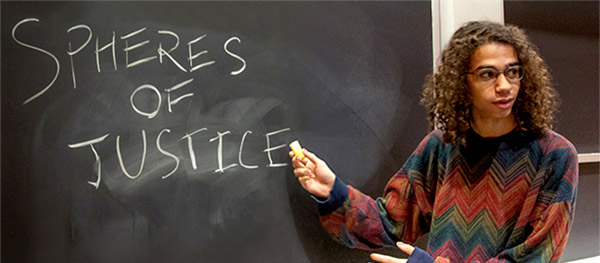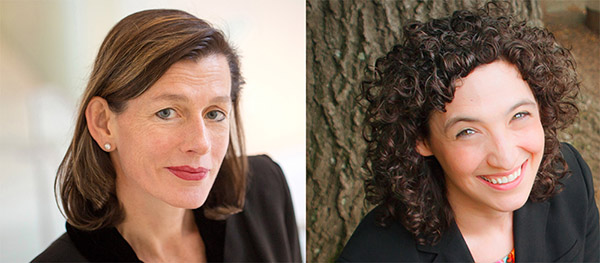Said and Done
SEPTEMBER 2020
MIT SCHOOL OF HUMANITIES, ARTS, AND SOCIAL SCIENCES
QUOTABLE
“The beauty of the Iñupiaq language is that the perspective and the wisdom of my ancestors has been preserved in the language. If we lose our language, we lose our ability to see into the minds of the people who were able to thrive — for millennia — in one of the harshest climates in the world.”
— Annauk Denise Olin, Linguistics graduate student, MIT Indigenous Languages Initiative
VOTING | 2020

MIT ELECTION LAB
Which way of casting a ballot is best for you this year?
Overview of voting options, along with the latest news and research on the 2020 election administration from the non-partisan MIT Election Lab, the Stanford-MIT Healthy Elections Project, and MIT Professor Charles Stewart III, Kenan Sahin Distinguished Professor of Political Science.
+ Take a look at the new Elections Performance Index website
THE MEANINGS OF MASKS

As The Washington Post has reported, "a fraught relationship with masks" is "at the heart of the dismal US coronavirus response." In this ongoing series of short commentaries, MIT faculty delve into the historic, creative, and cultural meanings of masks to offer more ways to think about, appreciate, and practice protective masking — currently a primary way to save lives and to contain the Covid-19 pandemic.
HISTORY
The masks of empire, arts, politics, and war | Catherine Clark
Historic masks of the early modern era include the gas masks which became essential gear on the WWI battlefields; the prosthetic masks that covered facial wounds of retuning soldiers; and the masks made for ceremonial uses in Africa, Asia, and the Americas that circulated in 20th century Europe as art.
Commentary
HISTORY
Masks for finessing an archaic political order | Jeffrey S. Ravel
"By the eighteenth-century in Venice, people had grown accustomed to wearing masks in public perpetually, not for health reasons but for social and cultural ones. Masking had become a way to allow Venetians of all classes to intermingle socially, economically, and culturally for a large part of the year without calling into question the archaic political order."
Commentary
CLASSICAL LITERATURE
Persona: Masks in the Graeco-Roman World | Stephanie Ann Frampton
"In Latin, one of the words for mask is persona, thought to have meant 'something through which sound passes' (per 'through,” sono “to make a sound'). Even in the time of Cicero, persona was already being used to describe the 'part' or 'character that one sustains in the world' — in other words, the role or roles we play in society."
Commentary
Browse the Full Series
The Meanings of Masks
STUDENT FEATURE | ON LANGUAGE AND CLIMATE CHANGE
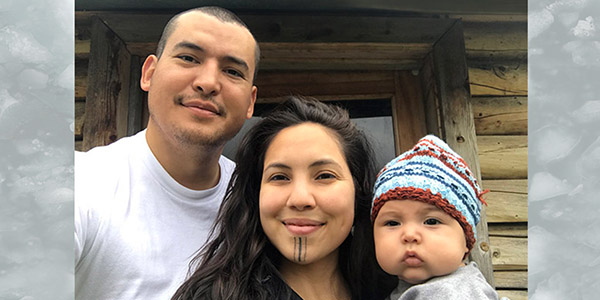
Linguistics graduate student Annauk Denise Olin and her family; Shishmaref, Alaska
LINGUISTICS | MIT INDIGENOUS LANGUAGES INITIATIVE
Saving Iñupaiq | Profile of Annauk Olin
Olin is working to preserve her Alaska Native language and to help her coastal village navigate the severe impacts of climate change. "We’ve had several homes fall into the ocean. We’ve lost hundreds and hundreds of feet of land," she explains. "Historically, we would expect sea ice to form around our island in September or October. In the last few years, we had winters where sea ice would not form until January. This should serve as a warning to the rest of the world." Story by SHASS Communications
RESEARCH + NEW BOOKS

L: Stephen Morris, Peter A. Diamond Professor of Economics; R: Barbara Partee PhD '65, Distinguished University Professor Emerita of Linguistics, University of Massachusetts, Amherst
LINGUISTICS
Research Profile | Barbara Partee PhD ’65
A pioneer in linguistics, Partee is the founder of the field of formal semantics, which applies logic and linguistics to the study of how the meanings of sentences are composed. She recently received the 2020 Benjamin Franklin Award in Computer and Cognitive Science.
Story at Slice of MIT | MIT Linguistics | Partee's webpage
ECONOMICS
Research Profile | Stephen Morris, Peter A. Diamond Professor of Economics
Professor Morris takes thorny problems about information and beliefs, and finds ways to model them, in areas applicable to finance, central banking, firm decisions, and even nonfinancial markets such as school-choice plans.
Story by Peter Dizikes at MIT News | Morris's webpage
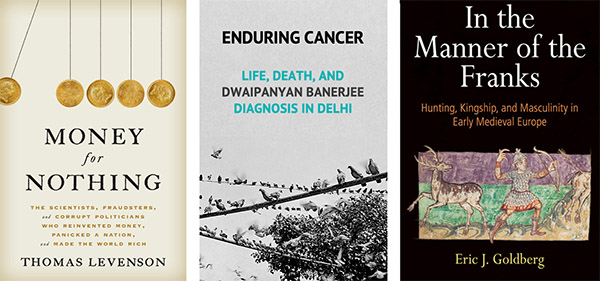
SCIENCE WRITING
Money for Nothing | Thomas Levenson
Professor Levenson's new book is a sweeping story of how the great minds of the Scientific Revolution applied their ideas to people, money, and markets — and invented modern finance. Nominated for the 2020 FT-McKinsey Best Financial Book of the Year prize. (Random House, 2020)
3Q at MIT News | WSJ review | Levenson's website
Virtual Event via the MIT Museum | 24 Sept, 7:30pm, free
Author Talk with Tom Levenson and Carl Zimmer
SCIENCE, TECHNOLOGY, AND SOCIETY
Enduring Cancer | Dwaipanyan Banerjee
"A landmark." In his deeply human ethnography of cancer in India, Assistant Professor Dwai Banerjee portrays the efforts of Delhi's urban poor to create a livable life with cancer. (Duke University Press, 2020)
About the Book | Banerjee's webpage
HISTORY
In the Manner of the Franks | Eric Goldberg
Goldberg’s of new book uses the lens formal hunting culture in early Medieval Europe to examine the development of political culture, gender, social hierarchies, and the taming of wilderness, as power became more consolidated throughout Europe. (Univeristy of Pennsylvania Press, 2020)
MIT News story | Goldberg's webpage
ALL RECENT BOOKS
MIT SHASS Online Bookshelf
Browse the bookshelf
COMMUNITY
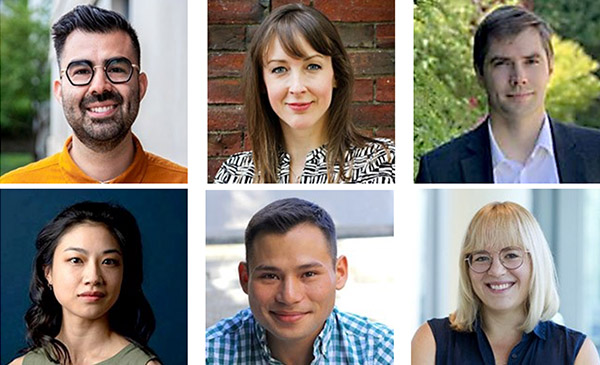
Top Row, L to R: Héctor Beltrán, Assistant Professor of Anthropology; Megan Black, Assistant Professor of History; Tristan Brown, Assistant Professor of History; Lower Row, L to R: Natalie Lin Douglas, Assistant Professor of Music; Erik Lin-Greenberg, Assistant Professor of Political Science; Asya Magazinnik, Assistant Professor of Political Science
WELCOMING NEW FACULTY
Six new professors join the MIT SHASS faculty
Dean Melissa Nobles and the School community are delighted to welcome six new members of the MIT SHASS faculty.
Gallery: Meet the New Faculty
WELCOME!
MLK Professor and Visiting Scholar join MIT-SHASS for 2020-21
Our School community is honored to welcome: Patricia Saulis, Executive Director of the Maliseet Nation Conservation Council in Canada, who will collaborate on a course with CMS/W Professor James Paradis; and Moya Bailey, a professor at Northeastern University, who will teach in the MIT WGS program.
Story at MIT News | Bailey webpage | Saulis webpage

L to R: MLK Visiting Scholar Patricia Saulis; MLK Visiting Professor Moya Bailey
COLLEGE OF COMPUTING
Six strategic areas identified for shared faculty hiring in computing
New faculty in these areas will connect the new College of Computing with a department or school.
Story by Teri Park, MIT News
IN MEMORIAM
Donald Blackmer, Professor emeritus of Political Science and MIT leader, dies at 91
An esteemed scholar and extraordinary steward of institutions and people, "Don was not only an immensely productive scholar and administrator, he was also a sweet and generous colleague. He will be dearly missed in the department," said David Singer, Head, MIT Department of Political Science.
Remembrance
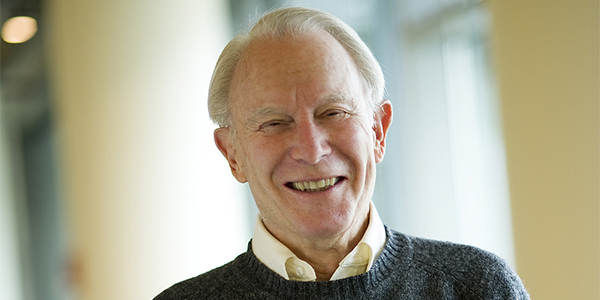
Donald Blackmer (1929-2020); photo by Stuart Darsch
EXPLORE
Follow us
Subscribe to Said and Done
10 issues a year
Media Digest
Current coverage
Making a Better World: Impact and Research
Browse 12 sectors
Perspectives for the Pandemic
Explore the Series
Making a Just Society
Explore the Resources
Solving Climate
Browse the Commentaries + MIT Climate Portal: Humanistic Features
Ethics, Computing, and AI: Perspectives from MIT
Full Series
Computing and AI: Humanistic Perspectives from MIT
Full Series
MIT Climate website
A major source of research, innovation, and discussion
Join us!
SHASS on MIT News
Research and Features
MIT Campaign for a Better World
Story | Join Us
Published by SHASS Communications
Office of the Dean, MIT School of Humanities, Arts, and Social Sciences
Editor and Designer: Emily Hiestand
Publication Associate: Alison Lanier
Published 16 September 2020

